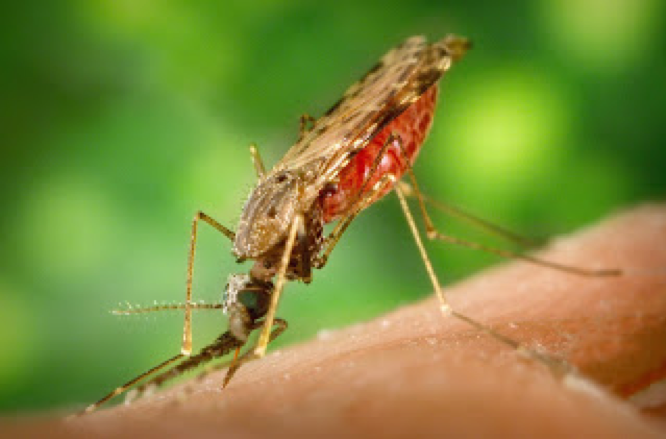In Part 1, we told you about important new scientific findings that may make it easier to predict where, when and by how much the disease will make its presence felt in future.
Now, Canadian researchers have concluded, while we may live far away from the topics, we cannot afford to be complacent. Changes in both our lifestyles and our climate could see not only malaria, but other mosquito-born diseases become established here.

The malaria mosquito, Anopheles albimanus. Photo by the Centres for Disease Control.
Mosquito-born diseases (MBDs) like dengue fever and malaria aren't currently established in Canada, partly due to our harsh climate. But global warming combined with increasing international travel, could change all that.
New research by a Canadian team from the National Microbiology Lab, the Public Health Agency of Canada (PHA) and two universities finds, given "an evolving situation" due to climate change, mosquitoes native to Canada "may become infected with new pathogens and move into new regions within Canada." But exotic species may move in, too, bringing diseases like malaria and dengue fever along with them, from afar.
"With high levels of international travel, including to locations where the diseases are present," states the report, "there will be more travel-acquired cases of MBDs."
The team therefore stresses a need for active surveillance, a high level of awareness and mosquito-bite prevention to guard against a worst-case scenario.

Victoria Ng, PhD. Senior Scientific Evaluator at the Infectious Disease Prevention & Control Branch for Public Health Agency of Canada.
A spokesperson for the study, Dr. Victoria Ng of the PHA tells PinP in an e-mail, "I think one of the biggest impacts of climate change for exotic MBDs in Canada will be the increase in travel-acquired cases as well as the potential for limited autochthonous (local) transmission of diseases where there is climatic suitability for mosquito vectors and reservoirs."
But these latest findings are not universally accepted. An expert who has contributed to other studies of malaria in Canada, Lea Berrang Ford (formerly with McGill University - now with the University of Leeds), is not too concerned.
In an e-mail to PinP, Prof. Berrang Ford concedes, climate change could create more favourable conditions for the disease. But he believes there are factors other than temperature, such as a strong health care system that'll make a resurgence unlikely.
While Dr. Ng agrees, other factors may make MBDs unlikely in Canada. But, she adds, "There's always the chance that, given a combination of suitable conditions occurring concurrently over time and space, that establishment could occur." She cites the introduction of West Nile virus in Canada some 20 years ago as a case in point.
While Canada is considered, for all intents and purposes, malaria-free, you might be surprised to learn, this has not always been the case. Known then as "fever and ague," the disease ravaged two early European settlements which later became known as Niagara-on-the-Lake and Kingston. While rarely fatal, it also affected those working on the Rideau Canal in the 1830s to such a degree, construction was seriously delayed. As a matter of fact, from 1780 to 1840 it became so pervasive, few newcomers were spared.
Is Malaria the real Grim Reaper?
Malaria IS one of the deadliest diseases in human history.
Some authorities describe gains made in controlling it, worldwide since the turn of the century as "one of the biggest public health successes of the 21st century." But since then, the World Health Organization, has scaled down that kind of rhetoric.
https://www.who.int/malaria/publications/world-malaria-report-2018/en/
“This year’s report (2018) shows that, after an unprecedented period of success in global malaria control, progress has stalled….no significant progress in reducing global malaria cases was made in reducing cases from 2015 to 2017. There were an estimated 219 million cases and 435 thousand related deaths in 2017.”
And an international partnership which allocates funds to combat the disease, believes it's still not certain what the future holds. "The Global Fund (TGF)" says, even more money, beyond the substantial amounts already spent, will be needed, just to keep it at bay.
By: Larry Powell
Larry lives in Shoal Lake, Manitoba where he publishes www.PlanetInPeril.ca (PinP), “where science gets respect.”
Visit "Is Malaria the real Grim Reaper? - Part 1" to learn about the new scientific findings in Malaria research.
